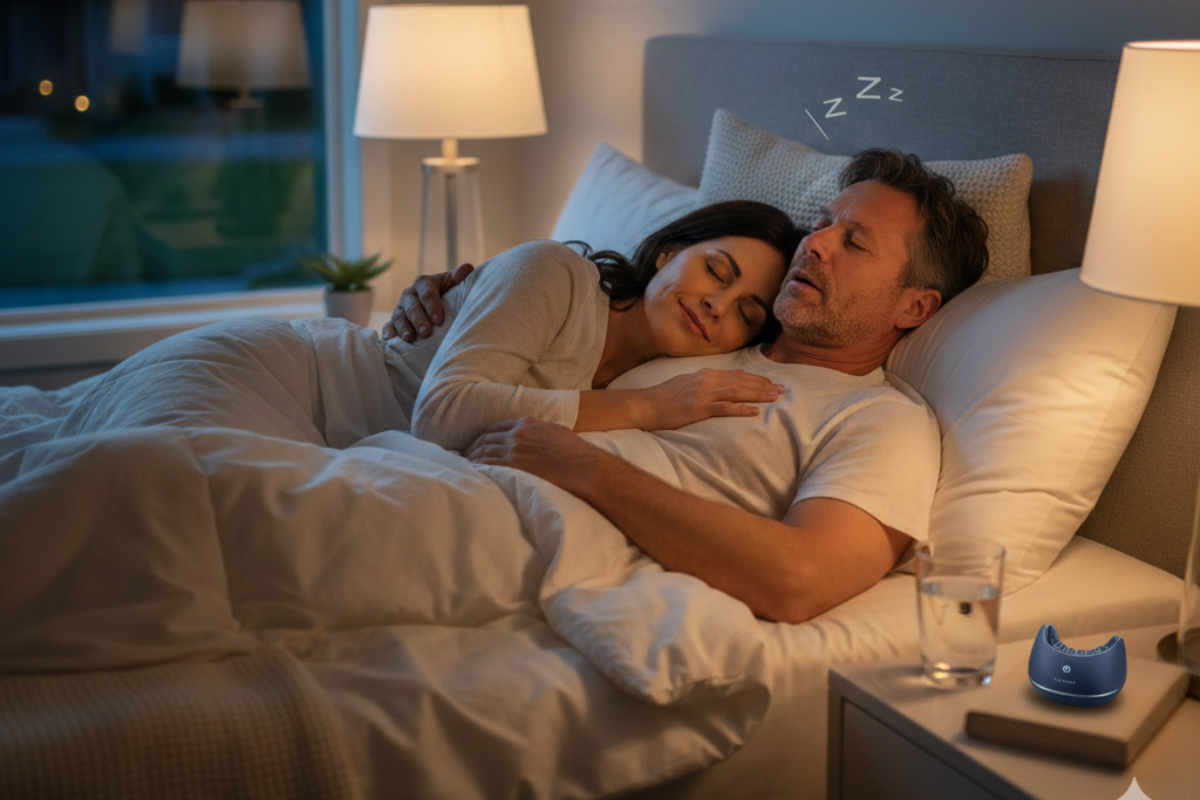Free Shipping - On Orders Over $99 (USA, Canada, UK, & AU)

How Do You Fix Sleep Apnea?
February 27, 2023 3 min read
Obstructive sleep apnea is a sleep disorder in which breathing repeatedly stops during sleep. It can seriously fragment your sleep, which can have serious consequences down the line: chronic sleepiness, increased risk of accidents, and hypertension [1].
If you have been diagnosed with or suspect you may have sleep apnea, you probably know that you need to treat this condition to stay healthy. Treatment is usually geared towards managing the condition, but you may be wondering if there are ways to fix this problem for good. Here is what you need to know about sleep apnea and its fixes.
Sleep Apnea: The Basics
Obstructive sleep apnea, known simply as sleep apnea, is a sleep-related breathing disorder. People with sleep apnea stop breathing or have shallow breathing during sleep. These episodes last over 10 seconds and repeat hundreds of times during a single night.
During sleep apnea episodes, blood oxygen levels drop. This alerts the brain to wake and triggers the gasping reflex. Most sufferers aren’t aware this is happening, however. Instead, they realize they have a problem when a bed partner alerts them or because they have symptoms associated with fragmented sleep.
Having fragmented sleep due to sleep apnea is the biggest problem here as it can seriously compromise health since sleep is essential. Sufferers may feel fatigued, and sleepy and have trouble focusing during the day. They may develop morning headaches due to low blood oxygen levels at night. Many also develop hypertension and may gain weight and end up with type 2 diabetes [1].
How Do You Fix Sleep Apnea?
The truth is that sleep apnea can’t really be fixed, but it can be successfully managed.
Most people with this condition benefit from continuous positive airway pressure (CPAP) therapy. With CPAP therapy, you wear a mask or nosepiece connected to a machine that delivers constant and steady air pressure. This helps keep the upper airways open while you sleep.
However, CPAP is not a cure. It only helps you get adequate sleep. The closest thing to a cure for sleep apnea is lifestyle changes. Clinical practice guidelines from the American Academy of Sleep Medicine, American College of Physicians, and others recommend weight loss, regular exercise, switching to a side-sleeping position, and avoiding alcohol and other sedatives [2].
Having excess weight, especially in the neck area, can constrict the airways and contribute to sleep apnea. Losing just 10% of your weight can reduce sleep apnea severity by 26% [3]. Exercising can help tone muscles that keep the upper airways open, and changing your sleep position and avoiding muscle-relaxing sedatives can be quite helpful, too.
How Else Is Sleep Apnea Managed?
While CPAP therapy is the most effective treatment for sleep apnea, not everyone can handle it. CPAP machines can be loud and cumbersome. Their masks or nosepieces can feel claustrophobic and uncomfortable, which makes falling and staying asleep difficult.
For patients who can’t adhere to this type of therapy, anti-snore mouthpieces are a good alternative. The clinical practice guidelines of the American Academy of Sleep Medicine recommend mandibular advancement devices (MADs) for mild to moderate sleep apnea [4]. These push the jaw gently forward to keep the tongue from collapsing at the back of your airways.
Another option is tongue-stabilizing devices like the Good Morning Snore Solution mouthpiece. Dentist-developed and clinically tested, this device pushes the tongue slightly past the lips to keep it from falling back and blocking your breathing.
References:
- Jordan AS, McSharry DG, Malhotra A. Adult obstructive sleep apnoea. Lancet. 2014;383(9918):736-747. doi:10.1016/S0140-6736(13)60734-5
- Kryger MH, Malhotra A. Management of obstructive sleep apnea in adults. UpToDate. Dec 2022. Available at: https://www.uptodate.com/contents/management-of-obstructive-sleep-apnea-in-adults
- Ferini-Strambi L, Fantini ML, Castronovo C. Epidemiology of obstructive sleep apnea syndrome. Minerva Med. 2004;95(3):187-202. https://pubmed.ncbi.nlm.nih.gov/15289748/
- Alshhrani WM, Hamoda MM, Okuno K, et al. The efficacy of a titrated tongue-stabilizing device on obstructive sleep apnea: a quasi-experimental study. J Clin Sleep Med. 2021;17(8):1607-1618. doi:10.5664/jcsm.9260
Also in Blog

Healthy Sleep Goals For 2026
December 22, 2025 6 min read

💨 Are Your Nighttime Breathing Issues Robbing You of Your Health and Your Energy?
December 12, 2025 3 min read
Breathing issues during sleep, collectively known as sleep-disordered breathing, are a major public health concern.

Is Your Snoring a Sign of Something More Serious? Unpacking the Science of Sleep
December 05, 2025 3 min read
When you snore, what's actually happening?
Join our Insiders Club
Every week you will receive specials, discounts, and giveaways.
Categories
- Better Sleep
- depression
- Fitness
- funny animal
- Global Citizenship
- health
- Mental Health
- mouthpiece
- nutrition
- pillow
- Productivity
- relationships
- sleep
- sleep apnea
- sleep deprivation
- Sleep Tech
- snoring
- snoring humor
- snoring jokes
- snoring sounds
- stop snoring
- StopSnoringStartLiving
- technology
- Tongue displacement
- travel
- video
- Young Adult

